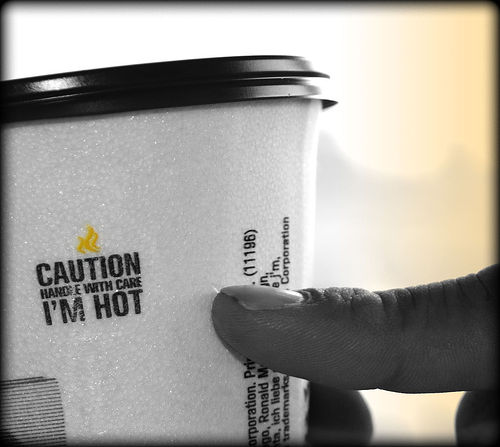
We’re on the cusp of an awakening, my friends!
We’re getting tired of finding potentially harmful chemicals everywhere we look, from our foods and personal care products to our homes and rivers and oceans. Slowly but surely, our voices are being heard.
A short time ago, the American Cancer Society (ACS) released a report identifying a gap in research for 20 suspected carcinogens. So far, the research has not determined whether or not these agents can cause cancer, and the ACS is calling for more studies. It’s time to stop wondering, waiting, and risking our lives. Instead, we need to find out what’s what so we can better safeguard our health.
Cinco Vidas applauds the ACS for taking this important step. Research takes time, however, so until the study results come in, I wanted to warn you about five of the 20 suspected carcinogens to which you may already be exposed. Here’s what they are, and how you can avoid them.
1. Styrene: You’ll find it in cigarettes, marijuana and foam food packaging (otherwise known as Styrofoam). Styrene is also used in the manufacture of plastics, rubber, and resins. Workers who make boats, tubs, and showers are potentially exposed to it. It can cause irritation of the skin, eyes, and upper respiratory tract, with chronic exposure affecting the central nervous system. The Environmental Protection Agency (EPA) and the International Agency for Research on Cancer (IARC) classify it as a possible human carcinogen. TO AVOID: If you smoke, stop. Don’t microwave in plastic containers, and avoid foam cups and containers (styrene leaches into heated food and drinks).
2. Tetrachloroethylene: Also known as PCE or PERC, you’re most likely to come in contact with this chemical in your dry cleaning. It’s also used to coat animal fur in taxidermy shops. Animal studies have shown it to cause liver cancer and leukemia, and epidemiological studies have linked it to esophageal and cervical cancer and non-Hodgkin’s lymphoma. TO AVOID: If you live above or next to a dry-cleaning shop, consider moving. Seek out alternative dry-cleaning methods (like wet-cleaning), air out your dry cleaning outside or in the garage for at least 24 hours before bringing it inside, or avoid dry cleaning altogether. If you store stuffed animal heads in your house that have been coated with PERC, reconsider their location.
3. Titanium Dioxide: This ingredient is everywhere, providing whiteness and opacity to cosmetics, paints, varnishes, lacquers, paper, plastics, ceramics, rubber, toothpastes, sunblock, and printing ink. The biggest danger is to workers in manufacturing facilities. Animal studies have established it as a cancer-causing element. The IARC has classified it as a possible carcinogen in humans. NOTE: I posted awhile ago that titanium dioxide was a preferred sunblock compared to chemical alternatives. After reading the ACS report, I did some checking. So far, the danger related to titanium dioxide concerns only high concentrations and ultrafine dust that gets into the lungs-in other words, the titanium dioxide you may find in mineral makeup. The form used in most sunblocks is too large at the molecular level to penetrate skin. Still, it’s probably best to go with zinc oxide, considered the safest sunscreen. TO AVOID: Stay away from cosmetic powders and creams with nanoparticles that include titanium dioxide. If you work with the chemical, take all the safety precautions.
4. Diesel Exhaust: Animal studies have linked the fumes to lung cancer, but because it’s difficult to isolate, more research is needed. TO AVOID: Exercise in clean-air locations, like parks, hiking trails, and indoor gyms. Stay away from city roadways full of exhaust.
5. The Graveyard Shift: Studies have shown that men and women who work the graveyard shift have a higher risk of prostate and breast cancer. More research is needed, as the studies haven’t taken into account other factors among graveyard shift workers that could be contributing to the risk, but so far the theory is that overnight work disrupts the body’s natural biological clock, which can interfere with hormones that usually suppress tumor growth. TO AVOID: If your job requires shift work, do everything you can to stay healthy otherwise-eat right, exercise, and get enough sleep as much as possible. If you can change to daytime hours, do it!
Have you read the ACS report? Please share your thoughts.
Photo courtesy CarbonNYC via Flickr.com.

